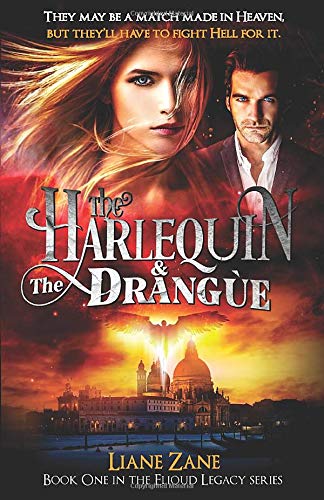
 Goodreads author Liane Zane is a published novelist under her real name, but has adopted this pen name for her new venture into paranormal romance, beginning with this opener for a projected series. She and I are Goodreads friends, so I accepted her offer of a free review copy, with no guarantee of a favorable one. PNR as such isn’t typically my thing (nor is “romance” in general, in the book trade sense); but both supernatural fiction and action adventure are, and I could easily approach this book in those terms. I’m also a sucker for a well-drawn action heroine who kicks butt and takes names –and here we have not just one but three such ladies.
Goodreads author Liane Zane is a published novelist under her real name, but has adopted this pen name for her new venture into paranormal romance, beginning with this opener for a projected series. She and I are Goodreads friends, so I accepted her offer of a free review copy, with no guarantee of a favorable one. PNR as such isn’t typically my thing (nor is “romance” in general, in the book trade sense); but both supernatural fiction and action adventure are, and I could easily approach this book in those terms. I’m also a sucker for a well-drawn action heroine who kicks butt and takes names –and here we have not just one but three such ladies.
Genesis, the first book of the Old Testament, referring to the time before Noah’s flood, states, “The Nephilim were on the earth in those days –and also afterward– when the sons of God went to the daughters of men and had children by them. They were the heroes of old, men of renown” (6:4). Biblical scholars are not agreed on exactly what the writer meant by this; but one ancient interpretation, articulated for instance in the inter-testamental Book of Enoch {which is not actually by Enoch], held that it refers to matings of rebellious angels and humans, with resulting offspring. Personally, I’m skeptical of that interpretation, but I can accept it as a fictional conceit in a novel; and it’s used as such in a number of modern novels, usually (as here) with the idea that these mixed bloodlines survived to the present day. Zane terms the descendants of these pairings the “Elioud;” her premise is that they may or may not know of their heritage and may have different amounts of angelic genes, but they inherit certain physical/mental powers, to the degree of angelic ancestry they have. Like angels and other humans, they also have free will; those who know their ancestry may ally themselves with God’s cause –or with the Adversary.
This information is the backdrop context for this novel; it’s disclosed more gradually in the book, but IMO it’s not a spoiler, and is actually helpful for the reader to know from the get-go. That understood, our setting is present-day central and eastern Europe, initially Vienna. Protagonist Olivia Markham is a young (I think her age is said to be 24) but very capable CIA agent stationed there, under the cover of graduate study and internship in international business development. But unknown to the Company, she has a side hobby: by night, she sometimes dons a Harlequin mask to take on sexual predators/rapists who use the Internet to line up victims; and she has a couple of female friends (also with backgrounds in covert intelligence) who help her.
Her latest target is a slime-ball who calls himself Asmodeus, the name of a demon in the Book of Tobit from the Apocrypha. What she doesn’t know, however, is that Asmodeus just might be his real name, and that he’s heading up a murderous cult who call themselves bogomili after a medieval Gnostic sect. (The Bogomils were an actual sect which originated in the Balkans, and which I’d read of before in various places, but the medieval Bogomils weren’t into murdering people to “liberate” their souls.) She also doesn’t know that he has another adversary watching him, a wealthy Albanian named Mihail Kastrioti, who has some friends of his own, friends who call him a drangue, which is usually translated as “dragon” in English. A drangue is a being known in actual Albanian folklore, but the concept is really pre-Christian and Zane has reinterpreted it somewhat. The plot takes off from there; and it’ll be quite a ride!
At 517 pages, this is a thick, substantial novel, but it doesn’t feel padded in the least; it flows quickly, with steady development of events, no dull moments, and a lot of action. In between, our heroines and heroes may stop to regroup and compare notes, and Zane may use the interludes to develop characters and impart information; but they’re interesting characters and information which are well worth developing and imparting, and which enhance the story. Characterization here is very adept and three-dimensional, and definitely a strong point. It’s obvious that the author also has done a lot of background research into history, Balkan culture and language (foreign-language phrases are translated for the reader where they need to be) etc.; it shows, but in a good way that masterfully evokes the setting as a seamless part of the narrative, not in the form of info-dumps or displays of erudition. She clearly has a particularly good grasp of the physical geography of Vienna and other cities where events take place. Action scenes are handled realistically and well. There’s a high body count, but no wallowing in gore for its own sake. As a whole, the story is a page-turner with a high tension and suspense factor, especially near the end.
While this is not “Christian fiction” in the commercial sense – it has a small amount of occasional profanity and obscenity, within the bounds of reasonable realism for the characters speaking – it is fiction written by a Christian. We get a picture of angels and demons, and their interaction, here which is morally and theologically consistent with what we’re told in the Bible, not a drastic reinterpretation of it in the manner of some modern writers. We’re solidly in the realm of a serious, high-stakes conflict between clearly defined good and evil, which grounds the novel and gives it substance. There’s no illicit or explicit sexual activity as such, though readers should be warned that there is one scene that could be described as “steamy”. There’s a clear closure to the immediate story arc with no cliffhanger, while the stage is clearly set for the projected sequel, which I want to read!
IMO, Olivia’s vigilante activities are unrealistic for a CIA operative. They’d be far too risky in terms of possible exposure and unwanted publicity: the Harlequin mask would hide her face, but still draw attention, and the consequences of her bosses’ wrath if they found out about it too drastic to risk. It’s also likely that the CIA’s recruiting process would have included psychological profiling which would have red-flagged vigilante tendencies; and there’s also the problem of what to do with offenders if she did catch them –just beat them up? Lethal force isn’t her default option –though she’s not squeamish about using it when she needs to– and she can’t make a citizen’s arrest and turn them in at the police station. The entire plot here unfolds in less than a fortnight, so there’s an insta-love situation with the attendant credibility challenge. If the angels mating with humans before the Flood were said to be disobedient, it renders it dubious to have similar unions going on in post-medieval times, between humans and angels in good standing. And one key aspect of the way a demon-acolyte bond magically works was a bit murky, at least to me. That kept my literary rating from a full five stars this time; but this is nonetheless a very good novel, and highly recommended!
The four-star kick-butt quotient here, for action-heroine action, draws on the activities of all three of our female spies/vigilantes. Olivia contributes her share to the body count I mentioned; but her two friends and sidekicks ably shoulder some serious action as well. My guess is that each of them are very likely to serve as protagonists in their own books in the series, which will make it at least a trilogy!
Author: Liane Zane
Publisher: Self-published; available through Amazon, both for Kindle and as a printed book.
A version of this review previously appeared on Goodreads.
 Firstly, I’m still trying to figure out the relevance of the cover (right). With a heroine named Kat, why is there a dog pictured? It’s not as if she even owns one at any point. The “size of the fight” line… well, tenuous at best. I should probably have listened to my instincts and skipped this frankly implausible tale, about a teenage girl who is smart, attractive and a black-belt martial artist with 34E breasts. Yet she ends up having to get work as a stripper, a job at which she is naturally brilliant (thanks to adopting a pseudo-Xena persona), in order to keep her alcoholic mother out of debt. She breaks the arm of a particularly unpleasant customer, Alex, an act which gets her the attention of Alex’s business partner. He runs McKenzie Personal Security, and offers Kat a job as a trainee bodyguard.
Firstly, I’m still trying to figure out the relevance of the cover (right). With a heroine named Kat, why is there a dog pictured? It’s not as if she even owns one at any point. The “size of the fight” line… well, tenuous at best. I should probably have listened to my instincts and skipped this frankly implausible tale, about a teenage girl who is smart, attractive and a black-belt martial artist with 34E breasts. Yet she ends up having to get work as a stripper, a job at which she is naturally brilliant (thanks to adopting a pseudo-Xena persona), in order to keep her alcoholic mother out of debt. She breaks the arm of a particularly unpleasant customer, Alex, an act which gets her the attention of Alex’s business partner. He runs McKenzie Personal Security, and offers Kat a job as a trainee bodyguard.




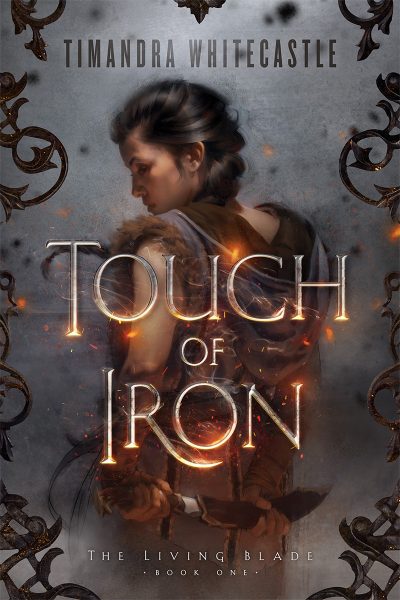 Owen and Noraya Smith are twins, in a world where such siblings are looked upon as cursed. Brought up as charcoal burners, they leave their village so Nora can avoid an arranged and unwanted marriage, and have the forture – whether good- or ill- remains to be decided – quickly to encounter the party of Prince Basham. He is scouring the country in search of a magical artifact called the Living Blade, which will grants its wielder great power. Assisting him is the half-wight Telen Diaz, a pilgrim/fighter. Owen joins the party, hoping to become a pilgrim himself; Nora decides to return home, but that option is removed from her as the village has been taken over by bandits. Fortunately, Diaz has followed her and is able to lend assistance when necessary. Nora eventually becomes his student in the fighting arts, and they all head to the temple/brothel of Shinar where the immortal seer Suranna can provide insight to the blade’s location. But the cost of her information is perilously high, since she has plans for both Nora and Diaz.
Owen and Noraya Smith are twins, in a world where such siblings are looked upon as cursed. Brought up as charcoal burners, they leave their village so Nora can avoid an arranged and unwanted marriage, and have the forture – whether good- or ill- remains to be decided – quickly to encounter the party of Prince Basham. He is scouring the country in search of a magical artifact called the Living Blade, which will grants its wielder great power. Assisting him is the half-wight Telen Diaz, a pilgrim/fighter. Owen joins the party, hoping to become a pilgrim himself; Nora decides to return home, but that option is removed from her as the village has been taken over by bandits. Fortunately, Diaz has followed her and is able to lend assistance when necessary. Nora eventually becomes his student in the fighting arts, and they all head to the temple/brothel of Shinar where the immortal seer Suranna can provide insight to the blade’s location. But the cost of her information is perilously high, since she has plans for both Nora and Diaz. This is the second book from Cooper here, after
This is the second book from Cooper here, after 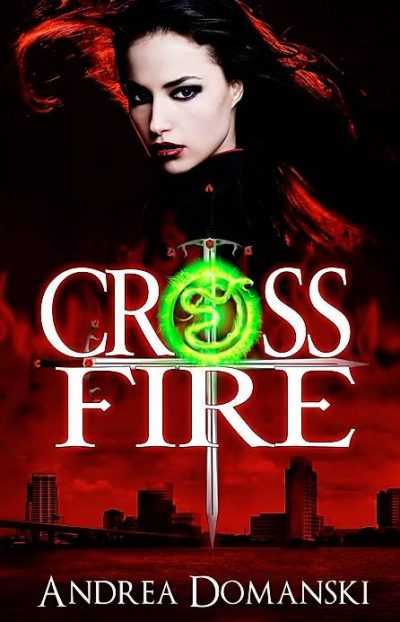 This is less a book than a hodge-podge of elements cobbled together from other sources. Buffy the Vampire Slayer and Wonder Woman are the most obvious influences, but you can also throw in some X Men and Greek mythology. Hell, the bad guy even uses the Force choke, as popularized by Mr. D. Vader. What’s missing is mostly originality. Though that’s not all.
This is less a book than a hodge-podge of elements cobbled together from other sources. Buffy the Vampire Slayer and Wonder Woman are the most obvious influences, but you can also throw in some X Men and Greek mythology. Hell, the bad guy even uses the Force choke, as popularized by Mr. D. Vader. What’s missing is mostly originality. Though that’s not all. I previously reviewed the ninth volume in the Wardstone Chronicles series,
I previously reviewed the ninth volume in the Wardstone Chronicles series,  I reviewed the
I reviewed the 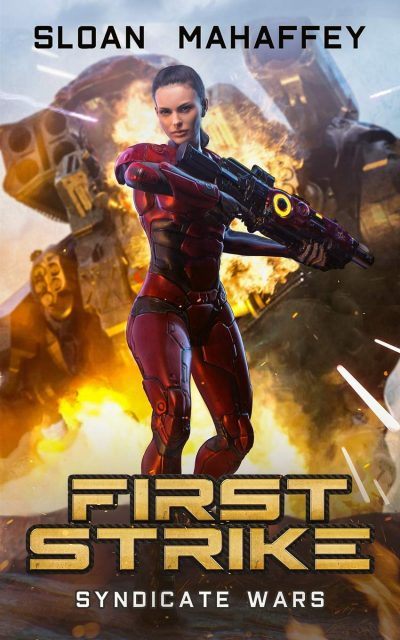 Not sure I’ve ever read a book with three authors before, though Amazon omit Noe from the list given on Goodreads. This “novel by committee” might explain some of the problems with this, and its failure to mesh the two strands in any effective way. It’s a pity, as it starts off in entirely blistering fashion, with the arrival on Earth of the Syndicate, an extra-terrestrial invading army. We knew they were coming, so humanity’s forces take them on, in a massive and spectacular battle at their landing site in Mexico. It doesn’t go well for us, thanks to the attacker’s vastly superior technology. Survivors are few, but include Marines Quinn and Giovanni.
Not sure I’ve ever read a book with three authors before, though Amazon omit Noe from the list given on Goodreads. This “novel by committee” might explain some of the problems with this, and its failure to mesh the two strands in any effective way. It’s a pity, as it starts off in entirely blistering fashion, with the arrival on Earth of the Syndicate, an extra-terrestrial invading army. We knew they were coming, so humanity’s forces take them on, in a massive and spectacular battle at their landing site in Mexico. It doesn’t go well for us, thanks to the attacker’s vastly superior technology. Survivors are few, but include Marines Quinn and Giovanni.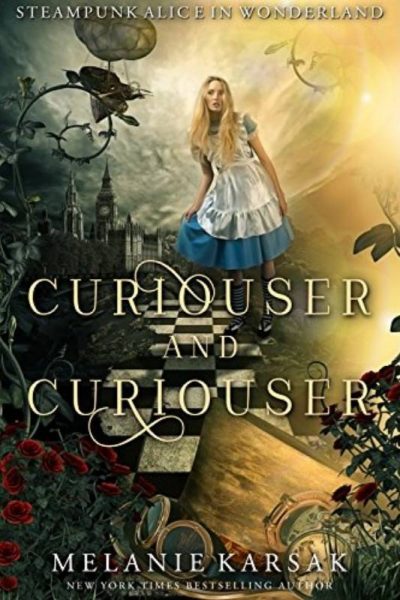 If you thought “Alice in Wonderland was okay, but it really needed more air-ships,” then this book is for you. It’s a steampunk take on Lewis Carroll’s classic tale, set in an alternate universe version of Victorian London. Specifically, 1851, when the renowned Great Exhibition took place in Hyde Park. Though it doesn’t actually feel particularly “alternate”; this angle lives mostly in its trappings, such as people using air-ships to get around, or clockwork cats, rather than in elements necessary to the plot. But that’s okay, because at its core, the story is strong enough to stand on its own.
If you thought “Alice in Wonderland was okay, but it really needed more air-ships,” then this book is for you. It’s a steampunk take on Lewis Carroll’s classic tale, set in an alternate universe version of Victorian London. Specifically, 1851, when the renowned Great Exhibition took place in Hyde Park. Though it doesn’t actually feel particularly “alternate”; this angle lives mostly in its trappings, such as people using air-ships to get around, or clockwork cats, rather than in elements necessary to the plot. But that’s okay, because at its core, the story is strong enough to stand on its own.
 Goodreads author Liane Zane is a published novelist under her real name, but has adopted this pen name for her new venture into paranormal romance, beginning with this opener for a projected series. She and I are Goodreads friends, so I accepted her offer of a free review copy, with no guarantee of a favorable one. PNR as such isn’t typically my thing (nor is “romance” in general, in the book trade sense); but both supernatural fiction and action adventure are, and I could easily approach this book in those terms. I’m also a sucker for a well-drawn action heroine who kicks butt and takes names –and here we have not just one but three such ladies.
Goodreads author Liane Zane is a published novelist under her real name, but has adopted this pen name for her new venture into paranormal romance, beginning with this opener for a projected series. She and I are Goodreads friends, so I accepted her offer of a free review copy, with no guarantee of a favorable one. PNR as such isn’t typically my thing (nor is “romance” in general, in the book trade sense); but both supernatural fiction and action adventure are, and I could easily approach this book in those terms. I’m also a sucker for a well-drawn action heroine who kicks butt and takes names –and here we have not just one but three such ladies.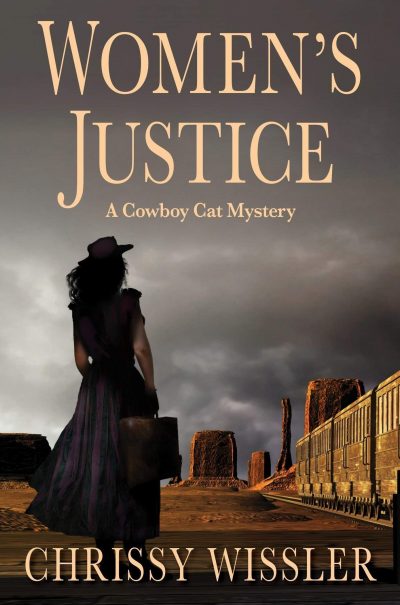 In the 1880’s, the town of Butte, Montana is a mining boom-town – instead of gold, it’s mostly copper which fuels its economy. The wealth comes at a cost, as the huge amounts of acrid smoke belched from the smelters and plants turns day into night, along with creating perpetually “noxious, disgusting air.” Off the train and into this smog steps Cat, a woman with no shortage of a past. A former prostitute, but also a ranch-hand, her preferred outfit of blue jeans and six-shooter is most atypical for a woman of the times. Almost immediately, she is drawn into the mysterious and suspicious death on the street of another “fallen woman,” Norma. The apparent cover-up goes right up to “Copper Kings” such as Marcus Daly (a real tycoon from that time and place), and it quickly becomes clear that whoever was behind Norma’s demise, is none to happy to find Cat looking into the matter. To find the truth, she’s going to have to navigate her way through both ends of Butte society.
In the 1880’s, the town of Butte, Montana is a mining boom-town – instead of gold, it’s mostly copper which fuels its economy. The wealth comes at a cost, as the huge amounts of acrid smoke belched from the smelters and plants turns day into night, along with creating perpetually “noxious, disgusting air.” Off the train and into this smog steps Cat, a woman with no shortage of a past. A former prostitute, but also a ranch-hand, her preferred outfit of blue jeans and six-shooter is most atypical for a woman of the times. Almost immediately, she is drawn into the mysterious and suspicious death on the street of another “fallen woman,” Norma. The apparent cover-up goes right up to “Copper Kings” such as Marcus Daly (a real tycoon from that time and place), and it quickly becomes clear that whoever was behind Norma’s demise, is none to happy to find Cat looking into the matter. To find the truth, she’s going to have to navigate her way through both ends of Butte society.